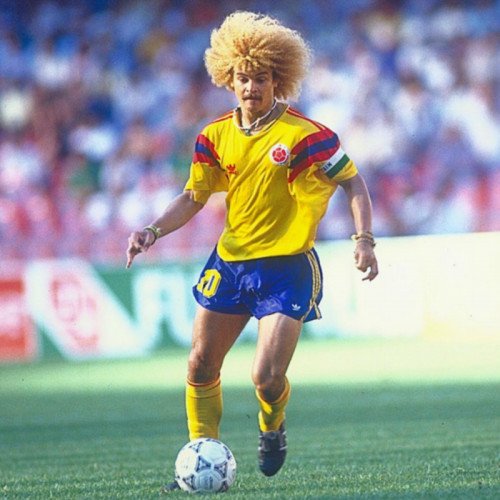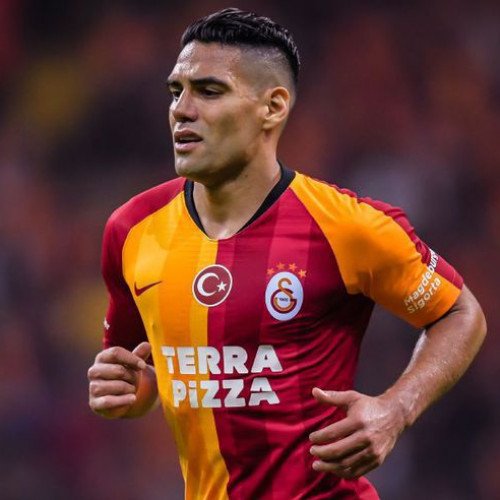The greatest Colombian soccer player

Carlos Valderrama
Carlos Alberto Valderrama Palacio (Colombian Spanish: [ˈkaɾlos alˈβeɾto βaldeˈrama paˈlasjo]; born 2 September 1961), also known as El Pibe ("The Kid"),[2] is a Colombian former professional footballer who played as an attacking midfielder. A creative playmaker, he is regarded as one of the best Colombian footballers of all time, and by some as Colombia's greatest player ever. His distinctive hairstyle, as well as his precise passing and technical skills made him one of South America's most recognisable footballers in the late 1980s and early 1990s. He won the South American Footballer of the Year award in 1987 and 1993, and in 1999, he was also named one of the top 100 players of the 20th century by World Soccer. In 2004, he was included in the FIFA 100, a list of the 125 "greatest living footballers" chosen by Pelé to celebrate the 100th anniversary of FIFA.[3][4][5][6][7][8] Valderrama was a member of the Colombia national football team from 1985 until 1998. He represented Colombia in 111 full internationals and scored 11 times, making him the most capped player in the country's history. He played a major role during the golden era of Colombian football in the 1990s, representing his national side in three FIFA World Cups and five Copa América tournaments. After spending most of his career playing club football in South America and Europe, towards the end of his career Valderrama played in Major League Soccer, joining the league in its first season. One of the most recognisable players in the league at the time of its inception, he helped popularise the league during the second half of the 1990s. To this day, he is an icon and is considered one of the most decorated players to ever play in MLS; in 2005, he was named to the MLS All-Time Best XI.
Statistics for this Xoptio

Radamel Falcao
Radamel Falcao García Zárate (Spanish pronunciation: [raðaˈmel falˈkao]; 10 February 1986) is a Colombian professional footballer who plays as a forward for Turkish club Galatasaray and captains the Colombia national team. He is sometimes nicknamed "El Tigre" (Spanish for The Tiger) or "King of the Europa League".[4][5] During his prime, he was regarded as one of the best strikers in the world.[6][7][8] Falcao began his professional career in the Colombian Second Division at the age of 13 at Lanceros Boyacá, before moving to the Argentine club River Plate, where he played with their youth academy for a few years and later won the 2007–08 Clausura tournament. In 2009, he joined the Portuguese club Porto, where he won several trophies, including the Europa League and Primeira Liga double in 2011.[9][10] Falcao became their all-time top goalscorer in international club competitions and set the record for most goals (17) in a European campaign. He also became the first Colombian to receive the Portuguese Golden Ball award.[11] In August 2011, Falcao was transferred to Atlético Madrid for a club record €40 million, leading them to Europa League and Super Cup victories in 2012. Falcao finished as top goalscorer for the second straight year and became the first player to win consecutive Europa League titles with two teams.[12][13] He was named in the FIFA FIFPro World XI in 2012,[14] and finished in 5th place for the 2012 FIFA Ballon d'Or. In May 2013, Falcao joined newly promoted Monaco for a club record €60 million; however, an ACL injury ruled him out for several months.[15] Falcao spent the next two seasons on loan at Premier League clubs Manchester United and Chelsea, eventually rejoining Monaco in summer 2016 and leading them to the Ligue 1 title for the 2016–17 season. Falcao made his senior debut for Colombia in 2007, and has since earned over 90 caps and scored 35 goals, making him their all-time top scorer. He represented his country at the 2011, 2015 and 2019 Copa América. Falcao missed the 2014 FIFA World Cup through injury, but made his World Cup debut at the 2018 tournament in Russia. In November 2018, Falcao was honored by the Atlético Madrid fans with a plaque outside the Metropolitano Stadium.